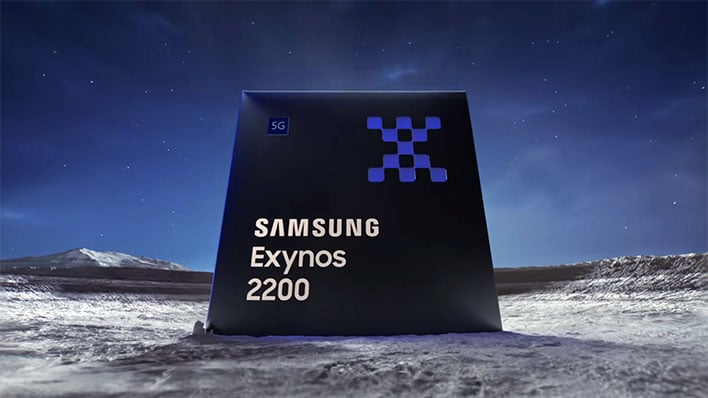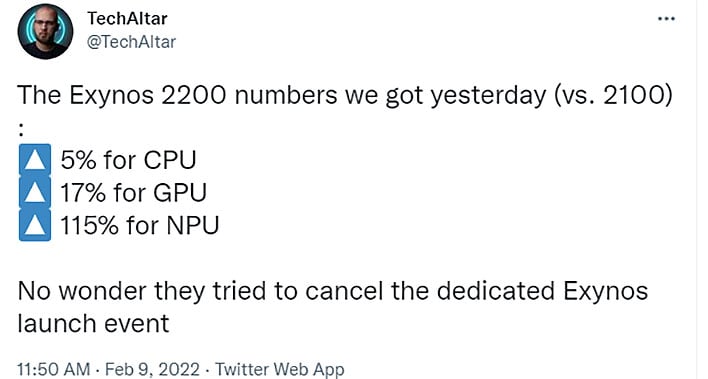Samsung Exynos 2200 May Barely Beat Last Gen's 2100 Even With Its RDNA 2 GPU

We were told in no uncertain terms that with the arrival of the Exynos 2200 with a GPU powered by AMD's RDNA 2 graphics architecture, "play time is over." And in a promotional video (see below), Samsung declared this would be the "chip to change the mobile gaming experience." Big words and big promises for sure, but apparently the Exynos 2200 is just a little faster in the areas that gamers and enthusiasts care about most.
This would explain why Samsung has been so coy with where the Exynos 2200 fits into its ecosystem. During the Galaxy S22 reveal, there was nary a mention of Samsung's home-brewed silicon. As Samsung has done in the past, its latest flagship phones will come in two variants—one built around Qualcomm hardware (Snapdragon 8 Gen 1) and another with its own silicon (Exynos 2200). Check out the hype video for the latter...
Prior to launch, we wondered if Samsung would roll solo with the Exynos 2200 for all models, given all the hype surrounding the chip's RDNA 2 graphics. But then a Twitter post promoting the chip's unveiling disappeared, and rumors surfaced that it was not hitting the desired clock speeds. It was also suggested that Samsung scrapped the Exynos 2200, though that wasn't true.
Samsung did end up announcing the Exynos 2200 with a GPU dubbed Xclipse 920, but it hasn't been the launch spectacle we anticipated. This despite being the first chip to arise from a partnership between Samsung and AMD. So what's the deal?
According to @TechAltar, the founder of Crrowd (an app and product review community), Samsung provided data indicating the Exynos 2200's CPU performs just 5 percent better than the previous generation Exynos 2100. The Xclipse 920 GPU delivers a bigger bump at 17 percent, but if that number is accurate as well, it's a disappointing generational leap, given that it's based on RDNA 2.
The one area that does see a massive increase is the NPU, which purportedly delivers a 115 percent improvement. That's nice to see, but not the kind of thing that's going to excite gamers.
"No wonder [Samsung] tried to cancel the dedicated Exynos launch event," @TechAltar remarked. He noted in a follow-up tweet," To be fair, we don't know much about power efficiency, heat, camera, and modem performance, etc. IRL, so it's hard to give an opinion on the chip, but the numbers are very underwhelming."
Samsung hasn't revealed clock speeds that we're aware of. However, leaker @rqaundt posted a Geekbench screenshot showing the chip's main Cortex-X2 peaking at 2.8GHz, which is 110MHz lower than the Cortex-X1 in the Exynos 2100. Likewise, the Cortex-A710 cores are shown hitting 2.52GHz, which is 310MHz lower than the Cortex-A78 cores in the Exynos 2100, while the four Cortex-A510 cores are shown hitting 1.73GHz, which is 500MHz lower than the Cortex-A55 cores in the last-gen SoC.
Note that we have not heard these same performance claims and/or clock speed revelations from Samsung ourselves. Given the shroud of mystery that hangs over such a hyped chipset, however, we're inclined to believe they're true, or at least more true than false.


